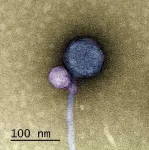(Press-News.org) New York, NY (November 2nd, 2023) — The Mount Sinai Health System has received a $7 million grant from the Multiple Myeloma Research Foundation for a three-year project that aims to fast-track novel translational concepts to improve outcomes for people with high risk myeloma, the second most common blood cancer in the United States.
This grant award will facilitate a multidisciplinary research project that will analyze a large, diverse cohort of patient samples from all over the United States at the genomic and immune level and apply novel functional genomics technology to understand the critical events that drive high-risk multiple myeloma and lead to treatment resistance. The project will also use state-of-the-art CRISPR genomics, spatial imaging, and chimeric antigen receptor (CAR) T cell technology to identify new therapeutic targets and drug modalities that can be harnessed for more effective treatments for high-risk multiple myeloma.
Multiple myeloma is a blood cancer that develops in the bone marrow and can spread throughout the body. In 2023, more than 35,000 Americans are projected to be diagnosed with multiple myeloma and approximately 12,000 will lose their lives. Despite advances, most patients relapse and there is still no cure. Multiple myeloma is twice as common in the Black community as in other ethnicities, and genetics and immune changes contributing to high-risk disease have not been elucidated.
“Advances in immunotherapy and novel agents have improved long-term outcomes for most myeloma patients, but a subset with high-risk newly diagnosed myeloma have early disease progression and inferior outcomes,” said Principal Investigator Samir Parekh, MD, Director of Translational Research in Multiple Myeloma and co-leader of the Cancer Clinical Investigation program at The Tisch Cancer Institute, a part of the Tisch Cancer Center at Mount Sinai. “We lack a detailed understanding of the genomic and immunologic differences between high-risk and standard-risk patients, and current trials with novel T cell therapeutics in relapsed myeloma continue to show shorter survival in high-risk patients. All of this highlights the urgent need for greater research efforts and new treatments for these vulnerable patients.”
This project is jointly led by Dr. Parekh and Brian Brown, PhD, Director of the Icahn Genomics Institute and Associate Director of the Marc and Jennifer Lipschultz Precision Immunology Institute at the Icahn School of Medicine at Mount Sinai. Dr. Brown said, “Through this endeavor, we expect to identify the genes responsible for high-risk myeloma growth and resistance to immunotherapy, as well as to identify novel targets for cellular therapy and bispecific antibodies.”
“Ultimately, our research network stands to greatly improve our comprehensive understanding of high risk myeloma and rapidly translate this knowledge into next-generation clinical trials for patients who desperately need novel therapeutic strategies,” said Sundar Jagannath, MD, Mount Sinai Professor in Multiple Myeloma and Director of the Multiple Myeloma Center of Excellence at the Tisch Cancer Center.
Mount Sinai is leading a network of researchers from institutions that include Albert Einstein Medical College, Hackensack University Medical Center, Stanford University Medical Center, University of California San Francisco, and Washington University in St. Louis.
Researchers hope to uncover the full landscape of genomic, proteomic and immune differences between high- and standard-risk multiple myeloma patients. They also hope to identify which differences drive faster myeloma progression and resistance to therapy and understand precisely how these differences influence treatment responses.
Mount Sinai was one of three teams to receive the highly competitive grant from MMRF as part of its Myeloma Accelerator Challenge (MAC) Program Grants. Each of these prestigious three-year multicenter translational projects is designed to advance compelling hypotheses that are ready for rapid testing in clinical trials, a critical step in the MMRF’s urgent pursuit of a cure for every myeloma patient.
“Our MAC Grants enable us to fund research that is highly focused and, by requiring multiple centers to work in a network, also highly collaborative,” said George Mulligan, PhD, Chief Scientific Officer at the MMRF. “The three exciting programs we selected each have potential to answer fundamental questions about multiple myeloma and help advance rational treatments for this cancer.”
About the Mount Sinai Health System
Mount Sinai Health System is one of the largest academic medical systems in the New York metro area, with more than 43,000 employees working across eight hospitals, over 400 outpatient practices, nearly 300 labs, a school of nursing, and a leading school of medicine and graduate education. Mount Sinai advances health for all people, everywhere, by taking on the most complex health care challenges of our time — discovering and applying new scientific learning and knowledge; developing safer, more effective treatments; educating the next generation of medical leaders and innovators; and supporting local communities by delivering high-quality care to all who need it.
Through the integration of its hospitals, labs, and schools, Mount Sinai offers comprehensive health care solutions from birth through geriatrics, leveraging innovative approaches such as artificial intelligence and informatics while keeping patients’ medical and emotional needs at the center of all treatment. The Health System includes approximately 7,300 primary and specialty care physicians; 13 joint-venture outpatient surgery centers throughout the five boroughs of New York City, Westchester, Long Island, and Florida; and more than 30 affiliated community health centers. We are consistently ranked by U.S. News & World Report's Best Hospitals, receiving high "Honor Roll" status, and are highly ranked: No. 1 in Geriatrics and top 20 in Cardiology/Heart Surgery, Diabetes/Endocrinology, Gastroenterology/GI Surgery, Neurology/Neurosurgery, Orthopedics, Pulmonology/Lung Surgery, Rehabilitation, and Urology. New York Eye and Ear Infirmary of Mount Sinai is ranked No. 12 in Ophthalmology. U.S. News & World Report’s “Best Children’s Hospitals” ranks Mount Sinai Kravis Children's Hospital among the country’s best in several pediatric specialties.
For more information, visit https://www.mountsinai.org or find Mount Sinai on Facebook, Twitter and YouTube.
END
Mount Sinai researchers receive $7 million to improve outcomes for high-risk blood cancer patients from the Multiple Myeloma Research Foundation
2023-11-02
ELSE PRESS RELEASES FROM THIS DATE:
Pascal Lee awarded the 2023 Carl Sagan Prize for Science Popularization
2023-11-02
November 2, 2023, Mountain View, CA -- The SETI Institute is delighted to announce that Dr. Pascal Lee will be honored with the 2023 Carl Sagan Prize for Science Popularization presented by Wonderfest. The prestigious Sagan Prize recognizes and encourages individuals who “have contributed wonderfully to the public understanding and appreciation of science.” Previous recipients from the SETI Institute include SETI Institute co-founder and SETI pioneer Jill Tarter, senior astronomer Seth Shostak and trustee Andrew Fraknoi.
“I am truly delighted and humbled by this award,” says Pascal Lee, “all the more because Carl Sagan was, and remains, ...
UMBC team makes first-ever observation of a virus attaching to another virus
2023-11-02
No one had ever seen one virus latching onto another virus, until anomalous sequencing results sent a UMBC team down a rabbit hole leading to a first-of-its-kind discovery.
It’s known that some viruses, called satellites, depend not only on their host organism to complete their life cycle, but also on another virus, known as a “helper,” explains Ivan Erill, professor of biological sciences. The satellite virus needs the helper either to build its capsid, a protective shell that encloses the virus’s genetic material, or to help it replicate ...
Research connecting gut bacteria and oxytocin provides a new mechanism for microbiome-promoted health benefits
2023-11-02
The gut microbiome, a community of trillions of microbes living in the human intestines, has an increasing reputation for affecting not only gut health but also the health of organs distant from the gut. For most microbes in the intestine, the details of how they can affect other organs remain unclear, but for gut resident bacteria L. reuteri the pieces of the puzzle are beginning to fall into place.
“L. reuteri is one of such bacteria that can affect more than one organ in the body,” said co-corresponding author Dr. Sara Di Rienzi, ...
How “blue” and “green” appeared in a language that didn’t have words for them
2023-11-02
CAMBRIDGE, MA -- The human eye can perceive about 1 million colors, but languages have far fewer words to describe those colors. So-called basic color terms, single color words used frequently by speakers of a given language, are often employed to gauge how languages differ in their handling of color. Languages spoken in industrialized nations such as the United States, for example, tend to have about a dozen basic color terms, while languages spoken by more isolated populations often have fewer.
However, the way that a language ...
Plant populations in Cologne are adapted to their urban environments
2023-11-02
A research team from the Universities of Cologne and Potsdam and the Max Planck Institute for Plant Breeding Research has found that the regional lines of the thale cress (Arabidopsis thaliana), a small ruderal plant which populates the streets of Cologne, vary greatly in typical life cycle characteristics, such as the regulation of flowering and germination. This allows them to adapt their reproduction to local environmental conditions such as temperature and human disturbances. The researchers from Collaborative Research Center / Transregio 341 “Plant Ecological Genetics” found that environmental ...
Making gluten-free, sorghum-based beers easier to brew and enjoy
2023-11-02
Though beer is a popular drink worldwide, it’s usually made from barley, which leaves those with a gluten allergy or intolerance unable to enjoy the frothy beverage. Sorghum, a naturally gluten-free grain, could be an alternative, but complex preparation steps have hampered its widespread adoption by brewers. Now, researchers reporting the molecular basis behind sorghum brewing in ACS’ Journal of Proteome Research have uncovered an enzyme that could improve the future of sorghum-based beers.
Traditionally, beer brewers start with barley grains, which they malt, mash, ...
Jurassic worlds might be easier to spot than modern Earth
2023-11-02
ITHACA, N.Y. –Things may not have ended well for dinosaurs on Earth, but Cornell University astronomers say the “light fingerprint” of the conditions that enabled them to emerge here provide a crucial missing piece in our search for signs of life on planets orbiting alien stars.
Their analysis of the most recent 540 million years of Earth’s evolution, known as the Phanerozoic Eon, finds that telescopes could better detect potential chemical signatures of life in the atmosphere of an Earth-like exoplanet more closely resembling the age the dinosaurs inhabited than the ...
Archaeology: Larger-scale warfare may have occurred in Europe 1,000 years earlier
2023-11-02
A re-analysis of more than 300 sets of 5,000-year-old skeletal remains excavated from a site in Spain suggests that many of the individuals may have been casualties of the earliest period of warfare in Europe, occurring over 1,000 years before the previous earliest known larger-scale conflict in the region. The study, published in Scientific Reports, indicates that both the number of injured individuals and the disproportionately high percentage of males affected suggest that the injuries resulted from a period of conflict, potentially lasting at least months.
Conflict during the European Neolithic period (approximately 9,000 ...
Study warns API restrictions by social media platforms threaten research
2023-11-02
University researchers from the UK, Germany and South Africa warn of a threat to scientific knowledge and the future of research in a paper published in Nature Human Behaviour, outlining the implications of changes to social media Application Programming Interfaces (APIs).
Over the course of 2023, numerous social media platforms including X, TikTok, and Reddit made substantial changes to their APIs – drastically reducing access or increasing charges for access, which the researchers say will in many cases make research harder.
APIs have been routinely tapped by researchers ...
Researchers engineer colloidal quasicrystals using DNA-modified building blocks
2023-11-02
Evanston, IL. --- A team of researchers from the Mirkin Group at Northwestern University’s International Institute for Nanotechnology in collaboration with the University of Michigan and the Center for Cooperative Research in Biomaterials- CIC biomaGUNE, unveils a novel methodology to engineer colloidal quasicrystals using DNA-modified building blocks. Their study will be published in the journal Nature Materials under the title "Colloidal Quasicrystals Engineered with DNA."
Characterized ...


